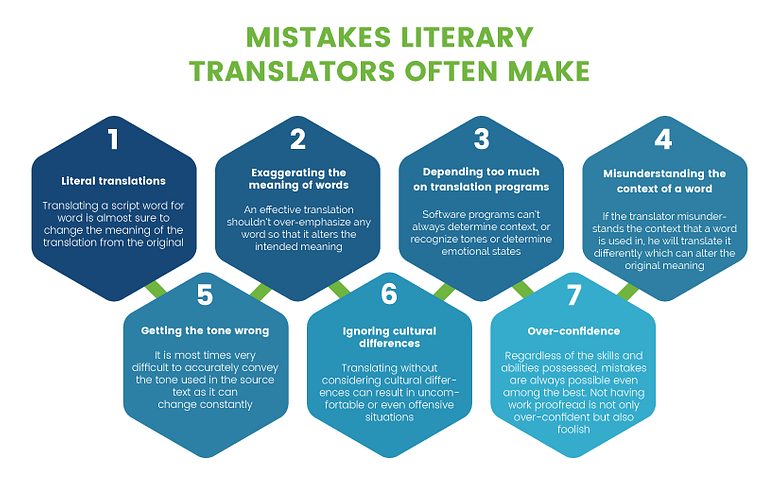
Why is literary translation a challenge?
Did you know that, other than religious books, Pinocchio has been translated into 260 languages? Written by the Italian author, Carlo Collodi, the book has also been translated and adapted into film and theatre versions.
Translation matters. It affects the reader’s response to a literary piece. But literary translation is not an easy endeavour.
Literary translation involves translating dramatic and creative poetry and prose into other languages, and it is a hugely important task. It helps to shape a reader’s understanding of the world, their history, philosophy, politics, and more.
So, exactly why is literary translation such a tough task?
Why is literary translation difficult?
Literary translation is significantly different from any other kind of translation. Just the volume of the texts sets this translation endeavour apart. Tackling a piece that runs in the region of hundreds of thousands of words is not an easy task, nor is attempting to recreate poetry in another language without losing the magnificence of the source text.
One of the biggest challenges in this arena of literary translation is the balance to remain true to the original work while creating an entirely unique piece that evokes the same responses as the original piece. Ask any literary translator, and they’re sure to tell you that even a single word can be a bother. The author has chosen a particular word for a particular reason, so it’s up to the translator to ensure it’s rightfully delivered in the target language. But, what happens there is no direct translation or even several options with different meanings?
Literary translation’s most common mistakes?
When it comes to literary translation, it’s important to capture the feeling and emotion, as well as the meaning of the piece of work. It can be tough trying to translate a book accurately without losing the soul of the book.
Here are 7 mistakes literary translators often make and how to avoid them.
Literal translations
Translating a script word for word is almost sure to change the meaning of the translation from the original.
Exaggerating the meaning of words
An effective translation shouldn’t over-emphasize any word so that it alters the intended meaning.
Depending too much on translation programs
Software programs can’t always determine context or recognize tones or determine emotional states.
Misunderstanding the context of a word
If the translator misunderstands the context that a word is used in, he will translate it differently which can alter the original meaning.
Getting the tone wrong
It is most times very difficult to accurately convey the tone used in the source text as it can change constantly.
Ignoring cultural differences
Translating without considering cultural differences can result in uncomfortable or even offensive situations.
Over-confidence
Regardless of the skills and abilities possessed mistakes are always possible even among the best. Not having work proofread is not only over-confident but also foolish.

How are things progressing in the literary translation industry?
More than a decade ago, it was estimated that just 3% of the books published in the U.S. were translations. However, the industry has seen in steady growth, with the LAF highlighting the diversity of source languages, particularly for English and Irish readers. Among the top ten languages translated, Japanese, Swedish, Arabic, Norwegian, and Dutch make the list, while Eastern European languages remain somewhat underrepresented. What that means is that there may well be huge scope for translation into those languages.
However, it seems that change is afoot. In 2016, the Man Booker International Prize was on par for both the translator of the winning novel and the author, showing how increasingly important literary translation is becoming in our world.
Another telltale sign that literary translation is on the rise is Amazon’s keenness to take on literary translation. AmazonCrossing, the translation publishing division, accounts for approximately 10% of all translations last year. Today, that division is the most productive publisher of translated fiction in the United States, covering 15 languages in 2016, including Hebrew, Indonesian, Finnish, Chinese, and Russian.
Where to from here for literary translation?
The growth in literary translation is an exciting one, and it seems to bode well for the future. In our modern society, translation of literature is playing a bigger and bigger role, and Amazon has become well positioned to play a big part in promoting the sharing of literary works between countries. With so many economic, religious, cultural, and political injustices and schisms in our world, it seems that anything that could bring us closer to understanding one another certainly deserves some sort of celebration.
About Wordminds
Wordminds is a close-knit team of language experts – professional translators, project managers, localisation engineers and business visionaries who work closely with global clients, helping them connect with their international audience. Wordminds works with over 3,000 language specialists and subject-matter experts to enable companies to overcome cultural and language barriers, helping them build trust and create long-lasting business and human relationships. Fully certified under ISO 9001 and ISO 17100, the company believes in continuous improvement and so stands at the forefront of new language-technology implementation, smart collaboration and excellent customer service. Find out more about Wordminds at www.wordminds.com.
Join our Newsletter
Stay up to date with the latest articles, news and translation insights


